#Farewell my Turnabout
Explore tagged Tumblr posts
Text
@one-time-i-dreamt 's pfp looks like an ace attorney mugshot tbh


#celeste impax#otid#one time i dreamt#ace attorney#ace attorney: justice for all#farewell my turnabout#1k notes#5k notes#10k notes#11k notes#12k notes
15K notes
·
View notes
Text

im actually obsessed with 2-4 phoenix he is tired of all this bullshit. i love how he does not say a word for like 5 minutes after edgeworth enters the room
#hes on no hours of sleep running on anxiety barely processing what just happened#i think hes allowed to lash out a little#im trying to get more comfortable posting doodles here because ive been doodling a lot to cope w the stress lol#phoenix wright#miles edgworth#franziska von karma#farewell my turnabout#ace attorney#fanart#art
4K notes
·
View notes
Text
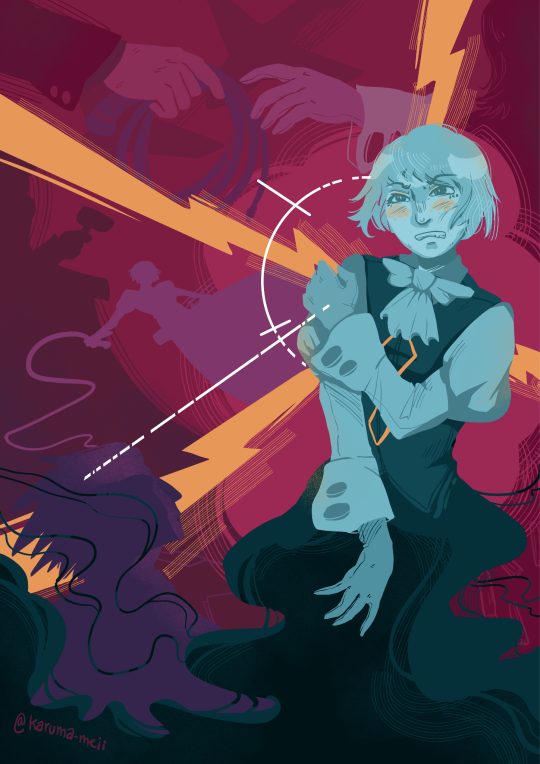
Turnabout, Franziska
#ohh boy its finally done#this is my first time ever trying out this sort of style be nice please#ace attorney#ace attorney fanart#aa fanart#franziska von karma#farewell my turnabout#aa 2-4#justice for all spoilers#jfa spoilers#franzy tag#illustration#my art#artists on tumblr#digital art
3K notes
·
View notes
Text
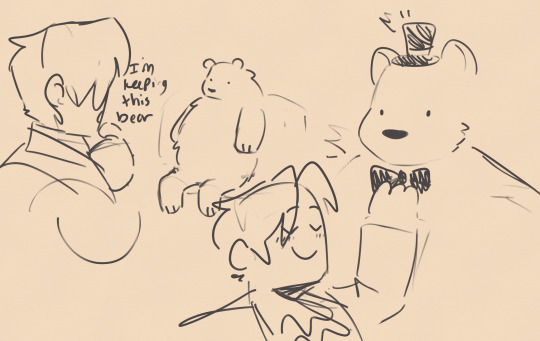

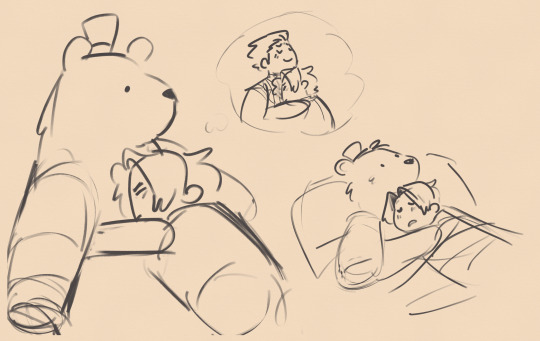
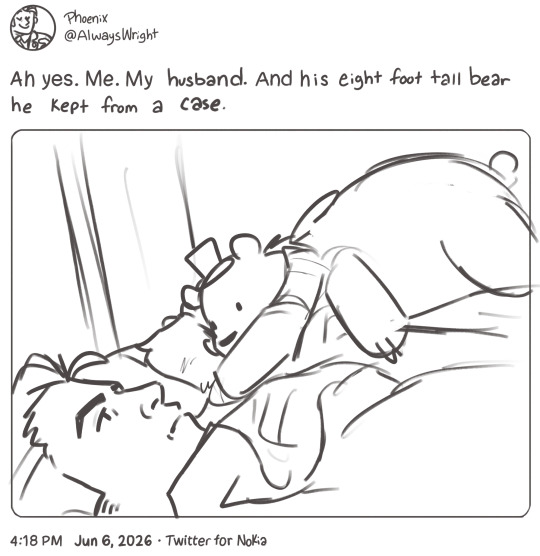
I also drew this a while ago but I think Miles kept the bear from the Engarde case
#doctorsiren#ace attorney#phoenix wright#miles edgeworth#maya fey#narumitsu#wrightworth#farewell my turnabout#ace attorney fanart#digital art#my art#procreate#doodle#and once they’re together#miles imagines Phoenix as the bear /silly
2K notes
·
View notes
Text
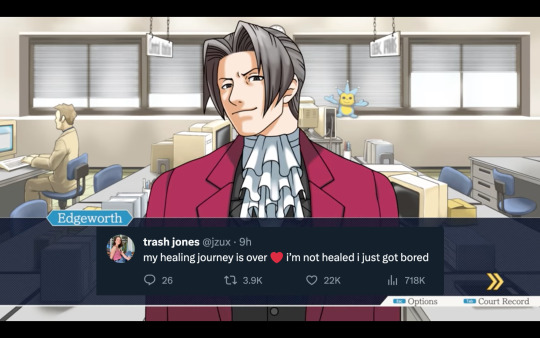
farewell, my turnabout
2K notes
·
View notes
Text
One thing I love about Miles Edgeworth is how realistic and practical he is, more than he is moralistic. As much as Miles cares about justice and doing what he thinks is right, he’s not fueled by belief the same way, for example, Phoenix is. And this is one of the things I feel like gets ignored or brushed aside when Miles's character is softened too much.
Both pre and post redemption, Miles puts a lot of emphasis on reality and the bottom line of what people can do in a situation.
In Turnabout Goodbyes, the first thing Edgeworth says in response to Phoenix asking him why he became a prosecutor instead of a defense attorney is: "… I couldn't let myself deny reality like you."
He also doesn't truly believe that every defendant he prosecutes is guilty, contrary to popular belief. In Turnabout Sisters, he says this: ""Innocent"…? How can we know that? The guilty will always lie, to avoid being found out. There's no way to tell who is guilty and who is innocent! All that I can hope to do is get every defendant declared "guilty"! So I make that my policy." Miles is disillusioned with finding the truth and trusting people that he settles for doing all he can hope to do.
And when you think about it, his motivation of finding the truth is an extension of his realism. After all, the truth is quite literally the most objective, realistic thing ever. In 1-3, after helping Phoenix convict Dee Vasquez, he says: "Will Powers was innocent. That he should be found so is only natural… not a miracle." The truth as a motivation is probably a grounding force for him.
When Miles comes back in Farewell My Turnabout, he calls out Phoenix's flawed motivations for becoming a defense attorney by offering realism: "We aren't some sort of heroes. We're only human, you and I. You want to "save someone"? That's something easier said than done, wouldn't you say? You are a defense lawyer. You can't run away from that. You can only fight. That's all you can do." Miles isn't saying Phoenix can't "save someone". Miles is saying that Phoenix shouldn't be so focused on saving someone that he forgets that his job as a defense attorney is only to fight for them.
Side note, I love the way Miles comforts people, he isn't exactly "nice" but he's incredibly kind. His blunt honesty digs at the heart of the matter, and he gives them an extra push because he respects them enough.
And then there's, possibly, my favorite Miles Edgeworth line: "It doesn't matter how many underhanded tricks a person uses… The truth will always find a way to make itself known. The only thing we can do is to fight with the knowledge we hold and everything we have. Erasing the paradoxes one by one… It's never easy… We claw and scratch for every inch. But we will always eventually reach that one single truth. This I promise you." This directly parallels the line he says in 1-2, and it makes me emotional every time I think about it.
The fact that Miles Edgeworth never lost his unwavering realism, in both quotes he acknowledges how untrustworthy people can be, but gained a new purpose.
#miles edgeworth I love you#very much#ace attorney#miles edgeworth#aa1#aa2#turnabout goodbyes#turnabout sisters#farewell my turnabout
433 notes
·
View notes
Text
I think a lot about the Concept of ‘choices that matter’ in video games. Like, in terms of what it is that makes a choice ‘really matter’, what do we perceive as a choice that matters or has a consequence, how do different games with different amounts of branching or non-branching storylines play with those ideas… Especially because Undertale is one of my favorite games of all time, and it has often been hyped as ‘a game where your choices REALLY matter’ and… honestly, I dunno if all of this hype was fully conducive to Undertale. Because the way it handles the concept of Video Game Choices is actually a lot more interesting and complex than that simplistic descriptor makes it seem.
Because Undertale actually has a lot of choices that ‘don’t really matter’! Lots of dialogue choices and silly little decisions that on a first playthrough seem like they’re some sort of moral choice or a branching plotline but end up always leading to basically the same result regardless of what you do!
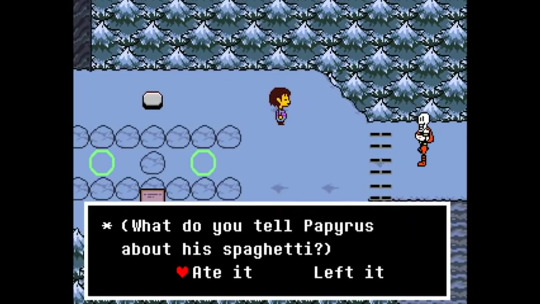
And the game doesn’t really try to hide the fact that these choices are kinda 'Fake'. I mean, on a first playthrough a player might assume there’s gonna be some Massive Consequences for picking the ‘wrong’ drink on Undyne’s date, but the game’s narrative expects for there to be multiple playthroughs and pretty much every Choice that Doesn’t Matter is peppered with that Undertale brand of wacky character-focused humor that inherently makes the moment memorable. Papyrus leading Undyne straight to you no matter what you do is basically a cross-timeline running gag.
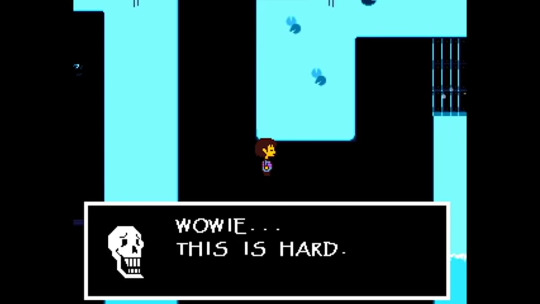
On some level I see this as a sort of gag that serves as meta-commentary about the expectations around Choices That Matter in Video Games. As in, a lot of games have their Moral Choices happen in clearly easily marked ‘this is a Moral Choice!’ moments within the story, while the actual gameplay (and any violence the player might cause as part of said gameplay) is basically entirely divorced from any element of narrative-branching and doesn't effect the story at all. Undertale basically entirely inverts this dynamic; the most important factor for which Route you’re own is how you handle your FIGHTs, and what seems like clearly-marked and obvious Moral Choices are just goofy insubstantial minor changes in dialogue.
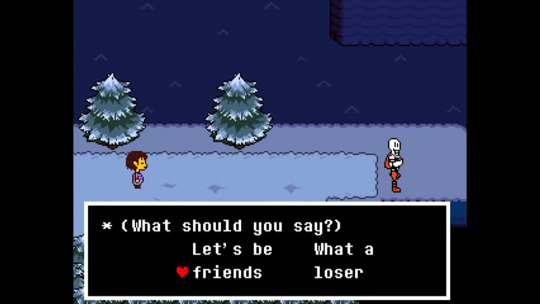
But also… there is also a level where you must ask yourself ‘what does it mean when we say that these choices Don’t Matter’. I mean, it’s not like they didn't change anything about the game, the Player still made the character say that other thing, the choice probably led to an alternate piece of dialogue, probably a joke with a call-back at the end of the game… The line between a one-off joke and an actual story-changing moment can be a little blurry if you look at it too deeply.

For example, near the end of the Waterfall part of the game, the Player is given the choice to save Monster Kid even at the risk of having to face down Undyne.

Pretty much anyone who isn’t deliberately trying to be an asshole is going to rush to save them and obviously that includes the Pacifist Route Players. But you can actually leave Monster Kid to die without it 'mattering' in the sense that it wouldn't divert you from the Pacifist Route. Undyne saves them instead of you, and ends up with slightly less HP for her battle (which might Matter for Runs when you try and FIGHT her but obviously not in Pacifist Runs) and… by the end of the game, during the extremely happy True Pacifist Ending, they still clearly remember that you abandoned them and are upset by it.

So… does saving Monster Kid ‘matter’ or not? On one hand, choosing not to save them mostly just changes a few lines of dialogue but… these lines of dialogue kinda recontextualize this happy ending and the Player’s actions in general. Despite the True Pacifist Ending otherwise portraying the Player/Frisk as a kind-hearted and brave hero... they still did this undeniably cowardly (and perhaps even cruel) act to one of their friends .
Was running away and leaving Monster Kid to die a brief but significant moment of weakness that the Player regrets and has cost them what could’ve been the start of a lovely friendship? Or is that simply that being a True Pacifist was always more of a matter of pragmatism rather than ideals? Were they only acting as a Pacifist to get that promised 'Best Ending', and only Monster Kid has an inkling they are not as heroic or kind as everyone thinks they are?
And then there’s the Snowman ‘quest’.
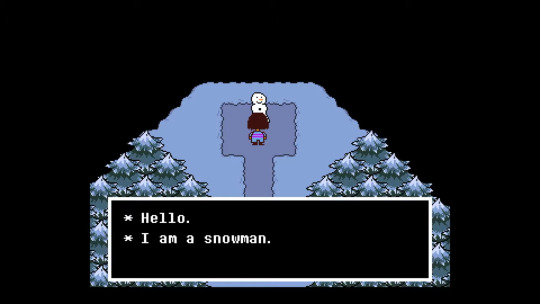
A free healing item given early in the game, with your mission being to carry it along in your inventory for as long as you can without ever consuming it. The only reward you will ever see from it is a few lines of dialogue…

But for many, it is more than enough of an incentive to preserve the Snowman’s Piece. You can do whatever you want with the Snowman without it ‘mattering’ in terms of Ending or consequences. You could carry it through all of your adventures with care and kindness... or you could eat it while he can’t see you and then go back to him and tell him that you ‘lost’ it and then get another piece and eat that as well, you could eat it right in front of his face, horrifying him.

And much like with Monster Kid, you can STILL get the True Pacifist Ending after doing that, all that would change is a few optional pieces of dialogue from the Snowman…

And a total recontextualization of the Player’s behavior and the ending. The Snowman sees the Player as a cruel and heartless person who is just pretending to be good so they can be liked - the way they acted with this immobile, powerless Snowman who could do nothing for them and their reputation reveals their true self. And he says their friends will realize that too one day...
Doing a True Reset on the Pacifist Ending is, by definition, a (almost) consequence-free action and yet it changes future Pacifist Routes immeasurably. Turning the Player into a Hypocrite doing the exact same thing they were trying to stop Flowey/Asriel from doing - trapping all of their friends into a time-loop so they can play with them forever while never actually letting them to enjoy freedom on the surface, simply because they are not willing to move on or put their friends' wishes and agency above their own. Nothing in the game actually changes, not one character can even suspect that you did something like that, and yet for the Player - this choice makes the entire Meaning of the game flip on its head.
Even the most famous and heavily-toted Big Consequence in the whole game - selling your soul to Chara after completing a Murder Route… mostly what it does is just… recontextualize the ending of the Game.
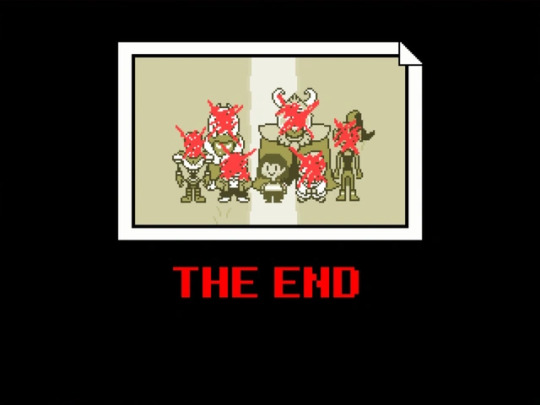
As a game, ‘Undertale’ is very much about the ways in which a Player engages with a game can radically recontextualize it. The huge chasm of difference between the Pacifist and Muder Routes is just the most literal example of it. But, in a way, even the tiny little Dialogue Options - where the lack of real choice and consequences is Obviously a Joke - matter. Because of the way they can recontextualize the Player Character’s behavior.
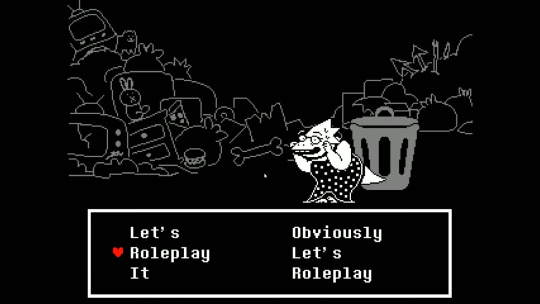
(Okay, maybe not this one, but hear me out…)
Do you trust Papyrus to not betray you, even after you spied on him with Undyne?
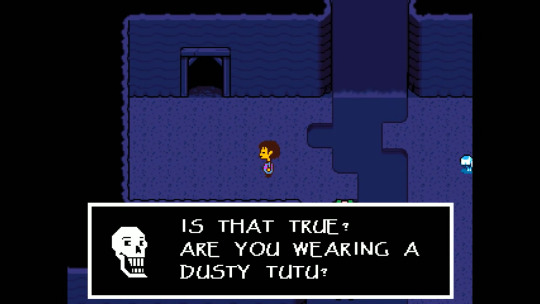
Do you have the integrity to admit you forgot something or got it wrong even when there’s no consequences for just lying about it?
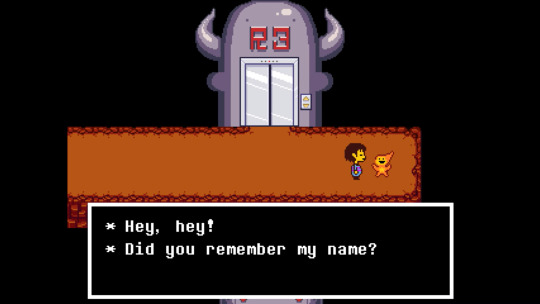
Are you a hypocrite for trying to get Alphys to be truthful with Undyne only to then immediately turn around and lie to Undyne yourself?
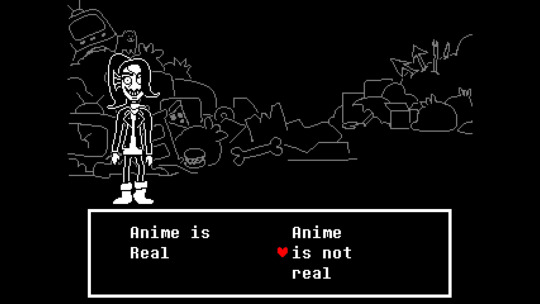
None of these choices matter for the ending, some of them don’t even get, like, a call-back joke or anything, but… if you are engaged in this story as a narrative, if you are invested in these characters as if they were people, if you are honestly trying to be the best person you can be, if you are trying to self-reflect at the way you approach this game… even the silliest little dialogue option can suddenly be imbued with deep implications and you can make them matter.
Undertale is one of the best demonstrations of this concept, but this is absolutely not exclusive to it. For example….
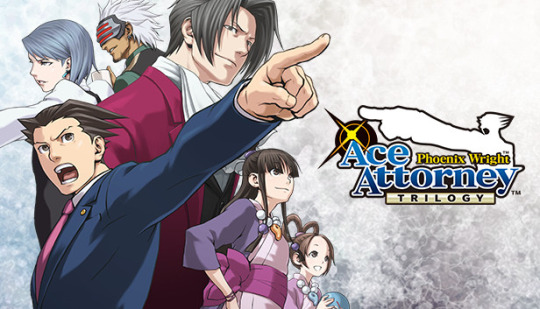
‘Ace Attorney’ is pretty much as far away as you can get from a ‘branching narrative’ within the video game sphere. It is a heavily-linear Visual Novel where 70% of the time it won’t even let you talk to random characters at anything but the exact order it expects you to and any ‘Bad Endings’ are basically just glorified Game Over Screens. (... because this is the Internet and something something piss on the poor, I should probably specify that I am talking about ‘Ace Attorney’ because I love Ace Attorney and these are neutral descriptions of the game and not complaints. There’s nothing wrong with a game being linear.)
If there’s any Dialogue Choice in AA, it’s generally a very basic ‘right answer-wrong answer’ choice between Progress and a Penalty, or a total non-choice that just gets you to the same final result regardless. Except… Well… as we just talked about, getting to the same final result doesn’t necessarily mean a choice is ‘meaningless’, does it?
There’s actually a lot of great storytelling moments where Ace Attorney, despite its otherwise strict linearity, uses this exact sort of recontextualizing mindset I’ve talked about with Undertale to make choices with some really powerful emotional impact…. Even if technically, the ending is the same ending. It can be something as basic as ‘even if picking this Wrong Answer doesn’t get me a penalty, it still embarrassed my character and disappointed my friends/rivals and thus I feel bad for picking it’. Consequences as recontextualizing your character as more incompetent than they should’ve come across at that moment.
And then there’s moments like the iconic ending of ‘Justice for All’. That moment before Franziska bursts into the Courtroom with the case-making evidence and saves the day. The moment where it seems like Phoenix really is gonna have to pick between protecting his best friend and carrying out a rightful sentence.

The player gets to pick between the two options, but Phoenix never gets to say his choice out loud before Franziska comes running in... and yet… he, and the player, still made that choice. Even if no one ever has to experience the consequences of your choice, even if the rest of the world has no idea what Phoenix Wright would’ve chosen if the Miracle hadn’t happened, we know what we picked and that knowledge of the choice matters. Because of how we feel about this choice and what it says about our interpretation of Phoenix… and about us.
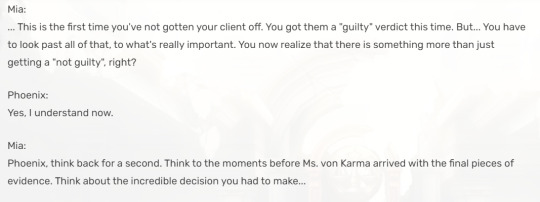

There’s also a bit of this ludonarrative device in ‘The Great Ace Attorney: Adventures’. During “The Adventures of the Runaway Room”, when you investigate the Omnibus for the second time and start finding things that… don’t quite fit together. When you’re finally starting to make progress with proving McGilded’s innocence, while also maybe starting to notice that something is… wrong with these pieces of evidence.

The unchanging linear narrative of the game is that Ryunosuke does eventually realizes McGilded's trickery, puts truth ahead of victory in court and yet, despite his effort and good intentions - the case still ends with a false Not Guilty verdict. And yet, the Player has the choice to... tweak the details.
There are several points where Ryunosuke can object, where he can call out the inconsistencies even though they help his case, where he can support Van Zieks in his accusations of tempered evidence... or he can not. Not necessarily intentionally misleading the Court as much as subconsciously trying to ignore the inconsistencies in the name of trusting his client.

And yet… in the end it doesn’t matter. Maybe Susato calls out the inconsistency instead of him, maybe Van Zieks does, maybe it remains uncontested but... no matter what you do, the case will end with a Not Guilty verdict (I mean, I guess you can deliberately fail the game but that will not progress the plot), McGilded doesn’t seem like he held a grudge (in the few minutes he had left to live), and a few cases later - Ryunosuke would always be punished for his part at this false verdict.
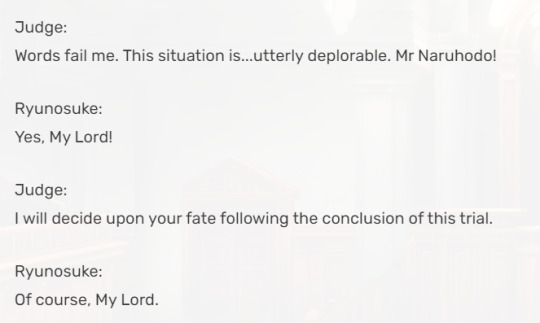
So it doesn’t really matter what Ryunosuke did back then? Does it matter if he did his best and called out every single inconsistencies or if he kinda half-assed it until he (and the Player) had to? He’s still going to suffer the same consequences down the line. And yet….
And yet, I think there’s something so powerful about giving us that option. About knowing that Ryunosuke, and we, did try and do something about McGilded's dirty tricks- even if it didn’t work. Or alternative, knowing that there was more that Ryunosuke and us could’ve done even if it was not nearly enough. Even if in the eyes of the game and the British Justice system there is no difference, the fact that we know what did and what we could’ve done can radically change the way the player feels about all of the later scenes concerning the truth about McGilded’s trial. It can radically change the way the player interpret Ryunosuke’s feelings about it as well.
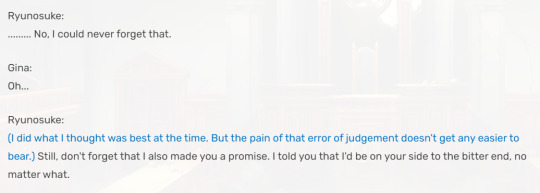
Because even though the game itself keeps playing along with the same script regardless, that trial had irrevocable consequences for the Player.
#undertale#ace attorney#ut#utdr#undertale analysis#undertale meta#ace attorney meta#the great ace attorney#under tale#tgaa#tgaac#dai gyakuten saiban#tgaa1#gaac#great ace attorney#aa2#justice for all#aa jfa#ace attorney jfa#farewell my turnabout#ace attorney justice for all#aa justice for all#phoenix wright#ace attorney trilogy#aa trilogy#phoenix wright trilogy#pwaa#phoenix wright ace attorney#gyakuten saiban
710 notes
·
View notes
Text


Rip Oldbag calling Phoenix a homophobic slur.
How she clocked Phoenix but somehow thought Miles freaking Edgeworth was straight enough to consider her an option is hilarious to me. The kind of delusion I wish I had.
#don't get me wrong i mostly prefer the dialogue changes#and i completely get why they changed this#but man so many newer fans probably don't even know about this#wendy oldbag#phoenix wright#farewell my turnabout#ace attorney
311 notes
·
View notes
Text
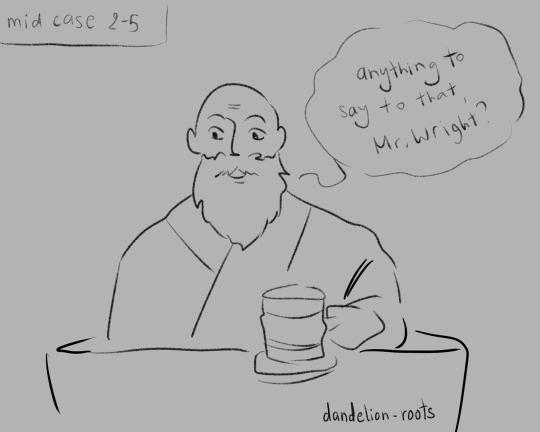

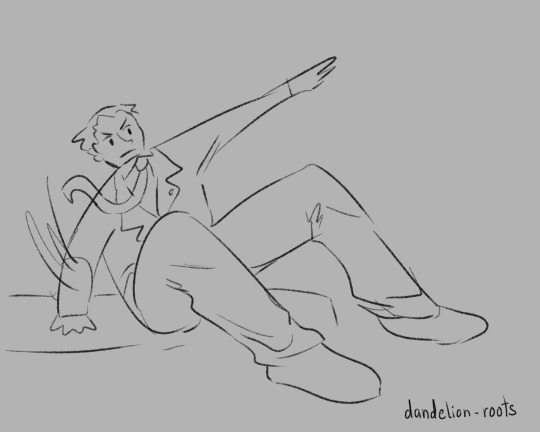

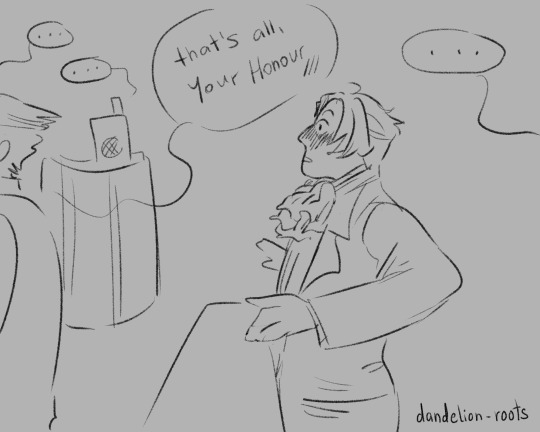
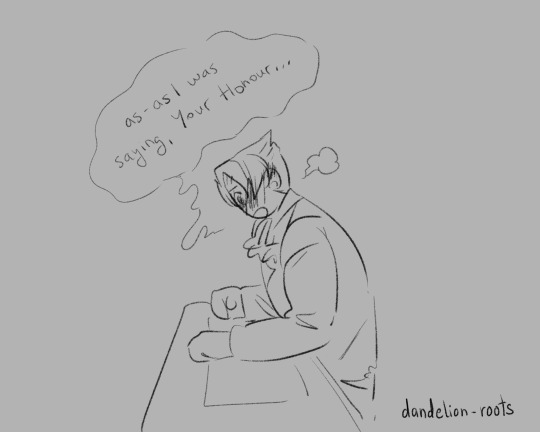
at one point during this trial (can't remember which exactly, but after edgeworth did something to help prolong it/help in general) i swear i saw heart eyes in phoenix's eyes and this scene played out in my head, enjoy
[id in alt]
#narumitsu#wrightworth#...is this the first adult narumitsu im posting skdskdjd help#it's meant to be kinda badly drawn for Humours but i'm fond of the surprised miles i drew. blorbo <3#phoenix wright ace attorney#phoenix wright#ace attorney#miles edgeworth#ace attorney justice for all#farewell my turnabout#farewell my turnabout spoilers#how do people tag spoilers in this fandom skdjkd help#ace attorney spoilers
495 notes
·
View notes
Text
I cannot overstate how important Phoenix and Edgeworth are to each other’s lives. There is something so beautiful about Edgeworth’s walls crumbling before the man who picked up his father’s legacy where he couldn’t. There is so much care in the fact that Edgeworth returns to guide Phoenix when duty versus personal circumstances shake the latter’s principles to their core.
They spend their lives reciprocating each other’s acts of kindness, and it is in this eternal dance that they find comfort, trust, and love in one another.
#ace attorney#narumitsu#phoenix wright#miles edgeworth#turnabout goodbyes#farewell my turnabout#vel talks ace attorney#they make me sick
273 notes
·
View notes
Text
Farewell my turnabout but its just Phoenix bonding with the gurls 💅
People have opened my eyes to Franziska and Phoenix as a duo. It is so funny to think about HSDFK
#ace attorney#phoenix wright#franziska von karma#pearl fey#farewell my turnabout#ace attorney justice for all#von karma#ferngully
298 notes
·
View notes
Text

The way I bursted out laughing
#edgeworth is standing next to him in horror#ace attorney#phoenix wright#ace attorney phoenix wright#ace attorney justice for all#pw:aa#farewell my turnabout#wrightworth#miles edgeworth#miles edgeworth x phoenix wright#naruhodo ryuichi#mitsurugi reiji
268 notes
·
View notes
Text

ace attorney be like these lesbians can fit so much trauma in them. happy pride
[Image ID: A digital illustration of Adrian Andrews from Ace Attorney with loose, pixellated line art. She wears her blue turtleneck from Justice For All. She is crossing her arms protectively around herself, her face cast slightly downwards and her eyes closed. She wears a conflicted expression. Behind her, there are a few roses and other small flowers twisting in a crown like shape above her head. The background is an indigo color with a flowery curly cue pattern. End ID.]
1K notes
·
View notes
Text
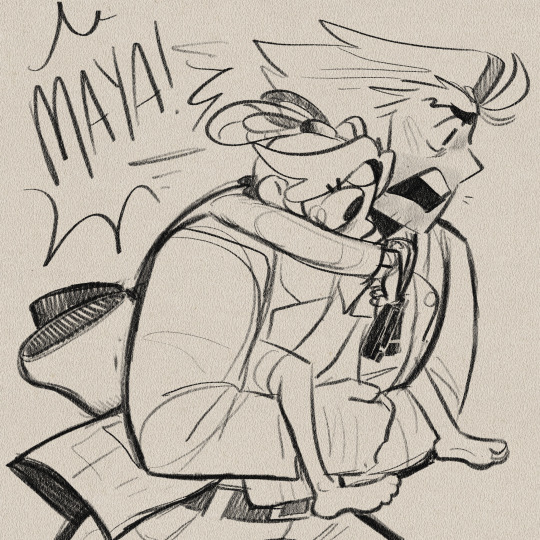
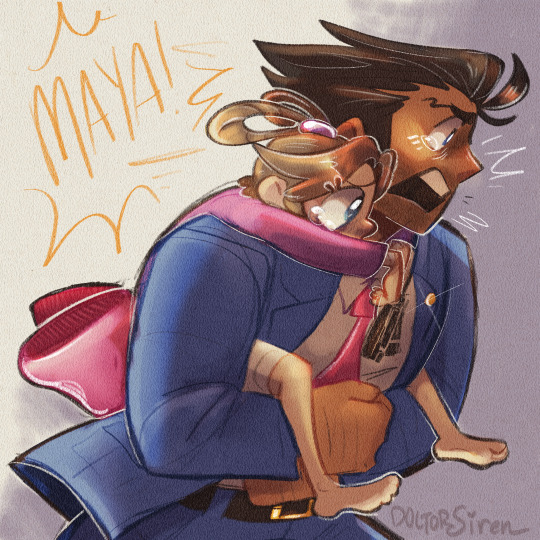
farewell my turnabout
#doctorsiren#ace attorney#phoenix wright#pearl fey#maya fey#farewell my turnabout#ace attorney fanart#digital art#my art#procreate#look…she’s a little rabbit#them big ol sad eyes
708 notes
·
View notes
Text

The judge during farewell my turnabout
#ace attorney#farewell my turnabout#yippee#i love ace attorney#miles edgeworth#phoenix wright#maya fey
137 notes
·
View notes
Text
Matt Engarde doodles cuz I hate him




Last one was meant to be more simple but I got carried away
#ace attorney#matt engarde#farewell my turnabout#art#my art#juan corrida#shelly de killer#adrian andrews
163 notes
·
View notes